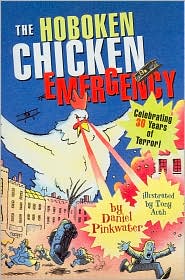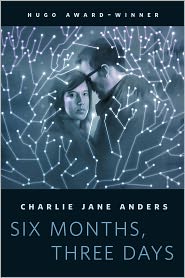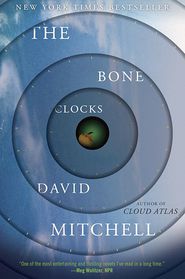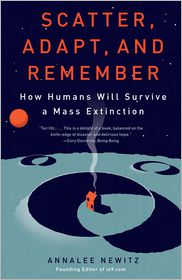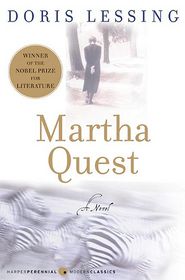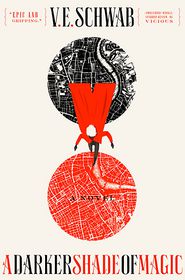An Optimistic Apocalypse Novel: Talking with Charlie Jane Anders
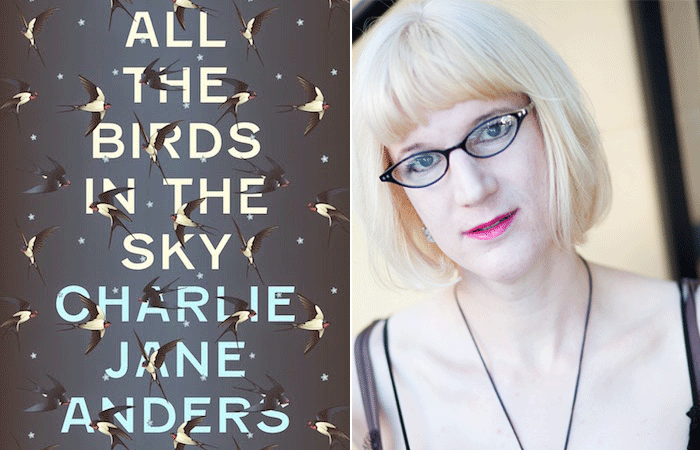 I’ve long admired Charlie Jane Anders’ work—both her reviews and cultural commentary over on io9, where she is editor-in-chief, and her award-winning short fiction. Her first genre novel, All the Birds in the Sky, is a perfect synthesis of both sides of her writing life: a deeply felt story of love, magic, science, growing up an outsider, and living in apocalyptic times, bubbling over with a deep knowledge of genre history and geek culture.
I’ve long admired Charlie Jane Anders’ work—both her reviews and cultural commentary over on io9, where she is editor-in-chief, and her award-winning short fiction. Her first genre novel, All the Birds in the Sky, is a perfect synthesis of both sides of her writing life: a deeply felt story of love, magic, science, growing up an outsider, and living in apocalyptic times, bubbling over with a deep knowledge of genre history and geek culture.
Last week at Book Expo America in New York City, I was lucky enough to grab a few minutes to talk with Charlie Jane about everything from Doctor Who fanfic, to where we’re headed as a species, as she prepared to sign a sizable stack of advance copies of her book, which isn’t out until next year, and which I can’t wait to tell you more about.
Do you remember the first story you ever wrote?
The first story I ever wrote, period? I was probably in third grate, writing Doctor Who fanfic in a little school notebook. Actually, I was in second or even first grade, and I was in a remedial program for people who have learning disabilities or are basically not doing well in school. They stuck me in this program for people with development problems, and I had this amazing teacher, Ms. Pennington, who I still hang out with occasionally. I wrote this thing in her workshop called “The Bad Cad,” about this character who was a bad cad and went around causing trouble. That was probably the first creative writing I did, and it was all thanks to this teacher who saw the potential in me instead of being like, “You’re one of the learning disabled kids who’s just going to be struggling.”
Did you write consistently from then on?
I think so. I think I wrote, I doodled, it was something I always knew I wanted to do on some level, because I really enjoyed doing it. Like I said, there was a lot of Doctor Who fanfic in fourth and fifth grade.
The Hoboken Chicken Emergency
The Hoboken Chicken Emergency
By
Daniel Pinkwater
Illustrator
Tony Auth
In Stock Online
Paperback $7.99
Was there a book that particularly made you want to write genre, or was it just being interested in Doctor Who and things like that that steered you in that direction?
I think that when I was a little bit older, stuff like Lloyd Alexander and Daniel Pinkwater had a huge impact on me.
I love Daniel Pinkwater. Which one was your favorite?
Maybe The Hoboken Chicken Emergency? Actually Wingman; Wingman was a great book. It’s a weird, it’s almost a YA superhero book that he did. He’s written so many books.
I always complain that my youth librarians were letting me read junk, but Daniel Pinkwater was one I just sort of stumbled across.
I still have a Daniel Pinkwater fridge magnet that somebody gave me.
Was there a book that particularly made you want to write genre, or was it just being interested in Doctor Who and things like that that steered you in that direction?
I think that when I was a little bit older, stuff like Lloyd Alexander and Daniel Pinkwater had a huge impact on me.
I love Daniel Pinkwater. Which one was your favorite?
Maybe The Hoboken Chicken Emergency? Actually Wingman; Wingman was a great book. It’s a weird, it’s almost a YA superhero book that he did. He’s written so many books.
I always complain that my youth librarians were letting me read junk, but Daniel Pinkwater was one I just sort of stumbled across.
I still have a Daniel Pinkwater fridge magnet that somebody gave me.
Six Months, Three Days: A Tor.Com Original
Six Months, Three Days: A Tor.Com Original
In Stock Online
eBook $1.99
What’s your favorite short story you’ve ever written?
I should probably say Six Months, Three Days since that’s the one that won the Hugo and got a lot of attention. I really have a strong attachment to “As Good As New,” which was the story that came out last fall on Tor.com; I think that might be my favorite. Either that or “Love Might Be Too Strong a Word,” which is a story that has a lot of really weird stuff going on in it, and was originally published in Lady Churchill’s Rosebud Wristlet, which means that it was chosen by Kelly Link, so that was a moment where I was like, “Holy s***, that’s kind of insane.”
How did you know that you wanted to write a novel? Was it something that was always brewing or did you feel that you’d proved yourself with short stories and were ready to take the next step?
There’s this conventional wisdom that says that people are either short story writers or novelists and that you can’t be both, or few people are both. So I was really enjoying writing short stories, I had a really good time with that—at one point I was trying to write a short story every week just to hone my craft and get better at writing endings, and just get better at writing complete narratives. And I wrote a lot of terrible short stories, some of which got published, unfortunately.
I think it was a combination of realizing that we no longer live in a world where you can have a successful career just as a short story writer—like, you have to write novels if you want people to read your work more broadly—and also, when I started trying to write novels, finding that there was a lot more scope to delve into themes and character and develop subplots. You could really introduce a theme and then have variations on the theme. So I really got sucked into writing novels.
What’s your favorite short story you’ve ever written?
I should probably say Six Months, Three Days since that’s the one that won the Hugo and got a lot of attention. I really have a strong attachment to “As Good As New,” which was the story that came out last fall on Tor.com; I think that might be my favorite. Either that or “Love Might Be Too Strong a Word,” which is a story that has a lot of really weird stuff going on in it, and was originally published in Lady Churchill’s Rosebud Wristlet, which means that it was chosen by Kelly Link, so that was a moment where I was like, “Holy s***, that’s kind of insane.”
How did you know that you wanted to write a novel? Was it something that was always brewing or did you feel that you’d proved yourself with short stories and were ready to take the next step?
There’s this conventional wisdom that says that people are either short story writers or novelists and that you can’t be both, or few people are both. So I was really enjoying writing short stories, I had a really good time with that—at one point I was trying to write a short story every week just to hone my craft and get better at writing endings, and just get better at writing complete narratives. And I wrote a lot of terrible short stories, some of which got published, unfortunately.
I think it was a combination of realizing that we no longer live in a world where you can have a successful career just as a short story writer—like, you have to write novels if you want people to read your work more broadly—and also, when I started trying to write novels, finding that there was a lot more scope to delve into themes and character and develop subplots. You could really introduce a theme and then have variations on the theme. So I really got sucked into writing novels.
The Bone Clocks
The Bone Clocks
In Stock Online
Paperback $19.00
I can imagine All the Birds in the Sky as linked novellas, because it kind of jumps around in time, and I felt like you can see some of that DNA in the book. It’s a little episodic at points. It kind of reminded me of The Bone Clocks, which is a linked short story collection.
I love episodic novels—I think I wrote a couple earlier novels that people thought were too episodic. I like that, and I like linked short story collections where it’s all in the same world. And that’s kind of insane praise, I love The Bone Clocks.
So how does your work on io9 inform your fiction? You’re reviewing a lot, and you’re talking about pop science issues, and environmentalism. Does that lead into what you’re doing with fiction?
It definitely does. I’ve been really happy, because I worried at first—I’ve been a fiction writer forever, and I told everybody when I first started at io9 that I still thought of myself as a fiction writer first and foremost, even though nobody else did at that point. I worried that spending that much time writing about science fiction would impact my science fiction writing, that it would dull it. I’m not really sure what I thought would happen—that my inner critic would get too amped up or that I would burn out or be stuck in rant mode or whatever.
But actually I’ve found that they feed into each other really, really well. Part of that is that having an inner critic that’s a little bit more active can be useful. I’m now hyper-sensitive to tropes, which is a good thing. But also I think that just spending that much time geeking out about storytelling, and what makes a good story, and how to tell a story that actually works, and getting paid to have these conversations with people all day—about the stories we like, the stories we were disappointed by, movies, TV, books—just having that ongoing conversation feeds into my love of storytelling. I find that I learn a lot just from geeking out about that stuff with people. It’s been like a creative writing program in some ways.
But then also, the science. I don’t do as much on the science side—I run the site overall now, but I’m much more closely involved on the entertainment side. But I do write about science, and I do read all of our coverage of science, and I get lots of ideas from [it]. And doing io9 has given me the confidence to go to scientists and ask them for help. So for example, in All the Birds in the Sky, there were a bunch of pieces where I went to them—I was like, “Well, I’ve got a super storm. How does that work? How do I make that realistic?” And just making sure that all my ducks are in a row.
In some ways, I think of the book as an optimistic apocalypse novel. It’s very dark at points, but it’s also ultimately hopeful about humanity. Where do you come down on the question? Considering what we’ve been doing to the planet to each other, do you see a hopeful end, or is it sort of wish fulfillment in your book?
I’m very worried. There’s a [scene] that got cut out of the book where somebody says, “We’ve built an unsustainable economic system on top of an unsustainable ecosystem, and now they’re all collapsing at once.” I could totally see that happening. We had two things that were not tenable, long-term. And the only ironclad law of economics is that if something can’t go on forever, it won’t. Definitely there’s a lot of stuff right now that can’t go on forever. I heard a speech the other day by Kim Stanley Robinson, who’s very concerned about what’s going to happen in the next century to the climate, and the amount of carbon that we’ll still be dumping into the atmosphere, and the giant financial incentives to keep doing that in spite of how terrible it is.
I can imagine All the Birds in the Sky as linked novellas, because it kind of jumps around in time, and I felt like you can see some of that DNA in the book. It’s a little episodic at points. It kind of reminded me of The Bone Clocks, which is a linked short story collection.
I love episodic novels—I think I wrote a couple earlier novels that people thought were too episodic. I like that, and I like linked short story collections where it’s all in the same world. And that’s kind of insane praise, I love The Bone Clocks.
So how does your work on io9 inform your fiction? You’re reviewing a lot, and you’re talking about pop science issues, and environmentalism. Does that lead into what you’re doing with fiction?
It definitely does. I’ve been really happy, because I worried at first—I’ve been a fiction writer forever, and I told everybody when I first started at io9 that I still thought of myself as a fiction writer first and foremost, even though nobody else did at that point. I worried that spending that much time writing about science fiction would impact my science fiction writing, that it would dull it. I’m not really sure what I thought would happen—that my inner critic would get too amped up or that I would burn out or be stuck in rant mode or whatever.
But actually I’ve found that they feed into each other really, really well. Part of that is that having an inner critic that’s a little bit more active can be useful. I’m now hyper-sensitive to tropes, which is a good thing. But also I think that just spending that much time geeking out about storytelling, and what makes a good story, and how to tell a story that actually works, and getting paid to have these conversations with people all day—about the stories we like, the stories we were disappointed by, movies, TV, books—just having that ongoing conversation feeds into my love of storytelling. I find that I learn a lot just from geeking out about that stuff with people. It’s been like a creative writing program in some ways.
But then also, the science. I don’t do as much on the science side—I run the site overall now, but I’m much more closely involved on the entertainment side. But I do write about science, and I do read all of our coverage of science, and I get lots of ideas from [it]. And doing io9 has given me the confidence to go to scientists and ask them for help. So for example, in All the Birds in the Sky, there were a bunch of pieces where I went to them—I was like, “Well, I’ve got a super storm. How does that work? How do I make that realistic?” And just making sure that all my ducks are in a row.
In some ways, I think of the book as an optimistic apocalypse novel. It’s very dark at points, but it’s also ultimately hopeful about humanity. Where do you come down on the question? Considering what we’ve been doing to the planet to each other, do you see a hopeful end, or is it sort of wish fulfillment in your book?
I’m very worried. There’s a [scene] that got cut out of the book where somebody says, “We’ve built an unsustainable economic system on top of an unsustainable ecosystem, and now they’re all collapsing at once.” I could totally see that happening. We had two things that were not tenable, long-term. And the only ironclad law of economics is that if something can’t go on forever, it won’t. Definitely there’s a lot of stuff right now that can’t go on forever. I heard a speech the other day by Kim Stanley Robinson, who’s very concerned about what’s going to happen in the next century to the climate, and the amount of carbon that we’ll still be dumping into the atmosphere, and the giant financial incentives to keep doing that in spite of how terrible it is.
Scatter, Adapt, and Remember: How Humans Will Survive a Mass Extinction
Scatter, Adapt, and Remember: How Humans Will Survive a Mass Extinction
In Stock Online
Paperback $21.00
So I’m very concerned, but on the other hand, I do think that, long-term, I have faith in humanity, I think that we’re a really adaptable species. And if you haven’t read [founding io9 editor] Annalee Newitz’s book Scatter, Adapt, and Remember: How Humans Will Survive a Mass Extinction, that’s a great optimistic apocalypse book. She does walk through why there will probably be an apocalypse at some point, and how we will get through that. And it’s funny because she and I were working on these books at the same time, and hers is nonfiction and mine is fiction, but they very much compliment each other.
I have a toddler, and I’m always thinking about what is she going to have to live through, and sometimes, it’s kind of like, what were we thinking? It’s scary to think about what it’s going to look in the next century.
It’s really terrifying. And apart from everything else, we have all these resources that we could have been using to build space stations or whatever, to build colonies on the moon, and instead we use them to build shopping malls and just drive back and forth to them. And I’m just like, “Why?” It’s the same amount of resources. I mean, that’s a little oversimplified, but…
We got to the moon in a decade, right? So if we work together…
Yeah.
If you boil the book down as much as possible, it’s science versus magic. Personally, where do you fall? Are you more of the science person or a magic person? Do you think we need a magical intervention to snap us out of it?
In my own personal life, I’m pretty pro-science. I’m an atheist, I don’t really believe in anything. I do sort of believe in magic in a weird way. Magical thinking; I have a lot of magical thinking. I felt like, in a sense, what I was trying to get at with the science-versus-magic thing is false dichotomies, or oppositions that don’t necessarily have to be oppositions—two very different ways of looking at nature and our place in the natural world. And the fact that nature is a human construct, that it’s something that we’ve invented to explain what is not us in the world. The conflict between science and magic is a conflict between two different ways of viewing our place in nature—whether we are on top or part of a greater whole. If anything, it’s a cautionary tale about being drawn into simplistic worldviews.
So I’m very concerned, but on the other hand, I do think that, long-term, I have faith in humanity, I think that we’re a really adaptable species. And if you haven’t read [founding io9 editor] Annalee Newitz’s book Scatter, Adapt, and Remember: How Humans Will Survive a Mass Extinction, that’s a great optimistic apocalypse book. She does walk through why there will probably be an apocalypse at some point, and how we will get through that. And it’s funny because she and I were working on these books at the same time, and hers is nonfiction and mine is fiction, but they very much compliment each other.
I have a toddler, and I’m always thinking about what is she going to have to live through, and sometimes, it’s kind of like, what were we thinking? It’s scary to think about what it’s going to look in the next century.
It’s really terrifying. And apart from everything else, we have all these resources that we could have been using to build space stations or whatever, to build colonies on the moon, and instead we use them to build shopping malls and just drive back and forth to them. And I’m just like, “Why?” It’s the same amount of resources. I mean, that’s a little oversimplified, but…
We got to the moon in a decade, right? So if we work together…
Yeah.
If you boil the book down as much as possible, it’s science versus magic. Personally, where do you fall? Are you more of the science person or a magic person? Do you think we need a magical intervention to snap us out of it?
In my own personal life, I’m pretty pro-science. I’m an atheist, I don’t really believe in anything. I do sort of believe in magic in a weird way. Magical thinking; I have a lot of magical thinking. I felt like, in a sense, what I was trying to get at with the science-versus-magic thing is false dichotomies, or oppositions that don’t necessarily have to be oppositions—two very different ways of looking at nature and our place in the natural world. And the fact that nature is a human construct, that it’s something that we’ve invented to explain what is not us in the world. The conflict between science and magic is a conflict between two different ways of viewing our place in nature—whether we are on top or part of a greater whole. If anything, it’s a cautionary tale about being drawn into simplistic worldviews.
Martha Quest (Children of Violence Series #1)
Martha Quest (Children of Violence Series #1)
In Stock Online
Paperback $17.99
That’s probably an important point to make in the current political climate. Are there any particular books that influenced or inspired you—authors, styles—while you were working on it?
Ursula Le Guin for sure, Kurt Vonnegut for sure. Also, my favorite author of all time is Doris Lessing. I read her when I was in college, or just out of high school, and she had a huge impact on me. She wrote this five-book series, the Martha Quest series, which I urge everybody to read. It’s starts of very biographical and small and intimate, and then it goes forward in time and eventually a little bit into the future, and there’s an apocalypse, and people start getting psychic powers, and there’s a nuclear war, and a bunch of other stuff happens, and she wrote it over like a 10-, 15-year period. She was deliberately [widening] the scope out as time goes by. It goes from being this small, personal story to being like, “And then there were mutants.”
How long did it take you to write? I read rumblings of it coming a couple years ago, but I also know that things in publishing take forever.
It was a combination of things. I had actually written a bunch of other novels. I started writing [this one] sometime in 2011 and I think we sold it in 2014, and then there were several rounds of edits. My agent wanted me to rewrite it a lot before we took it out, and I had already written and rewritten several times in response to feedback. So we sold it in early 2014 and I got another huge edit letter and spent months reworking it. So basically through the summer of 2014 I was rewriting it and sharpening it. There was a lot of stuff where it was like, “Oh man, I can’t believe I didn’t see that.”
How did you know that this was the one, if you’ve written previous novels? Was it just that this one sold?
It was partly just that this one sold. I had one novel, a straight-up literary novel, that I had an agent shopping around back in 2007, and I’d published a [literary] novel back in 2005, and there were other novels that for other reasons never quite got there—I polished them and polished them and then I never got anybody to fall in love with them the way they needed to. And then right before All the Birds in the Sky, I had an urban fantasy novel that I’d written, and it ended up coming down to that novel versus All the Birds in the Sky. After all the attention that Six Months, Three Days got, plus [that] the urban fantasy novel didn’t feel quite as uniquely mine, it was much more…
It’s definitely of a piece with your short fiction. It’s science-y, but not super hard science, and it has a little bit of that magical thinking in it. It definitely seems like the natural book for you to come out with.
That was kind of what I ended up feeling. The urban fantasy book was like me trying to write like Richard Kadrey or somebody like that. And I love that stuff, and I really enjoyed writing it, and maybe at some point I’ll be able to reuse some of it for something. But this felt much more like a book that only I could have written
Are you working on something else now?
I have a two-book deal with Tor, so I’m working on the next book. I can’t really talk about it too much yet, except that it’s completely different. It’s not a sequel and it’s not the same kind of book at all. It’s science fiction, and it’s set in the future.
What’s your writing process?
I’ve had the same writing process basically for forever. Because even before I was doing io9, I had a day job where I was writing about other stuff so every day, hopefully in the late afternoon, I get out of the house finally and I take a really long walk—two or three miles to a café somewhere—and sit there and just write fiction and don’t think about anything else. The long walk helps to clear my mind. And then I get dinner and walk home or do whatever I’m going to do in the evening. Ideally, on a good day, I get a couple hours of working on my fiction and a nice, long walk. Five or six miles a day, if I can. San Francisco has really great hills.
I’m not a fan of walking on an incline.
It’s really good for core strength and all that stuff.
That’s probably my problem; I don’t think about my core enough.
Who does?
That’s probably an important point to make in the current political climate. Are there any particular books that influenced or inspired you—authors, styles—while you were working on it?
Ursula Le Guin for sure, Kurt Vonnegut for sure. Also, my favorite author of all time is Doris Lessing. I read her when I was in college, or just out of high school, and she had a huge impact on me. She wrote this five-book series, the Martha Quest series, which I urge everybody to read. It’s starts of very biographical and small and intimate, and then it goes forward in time and eventually a little bit into the future, and there’s an apocalypse, and people start getting psychic powers, and there’s a nuclear war, and a bunch of other stuff happens, and she wrote it over like a 10-, 15-year period. She was deliberately [widening] the scope out as time goes by. It goes from being this small, personal story to being like, “And then there were mutants.”
How long did it take you to write? I read rumblings of it coming a couple years ago, but I also know that things in publishing take forever.
It was a combination of things. I had actually written a bunch of other novels. I started writing [this one] sometime in 2011 and I think we sold it in 2014, and then there were several rounds of edits. My agent wanted me to rewrite it a lot before we took it out, and I had already written and rewritten several times in response to feedback. So we sold it in early 2014 and I got another huge edit letter and spent months reworking it. So basically through the summer of 2014 I was rewriting it and sharpening it. There was a lot of stuff where it was like, “Oh man, I can’t believe I didn’t see that.”
How did you know that this was the one, if you’ve written previous novels? Was it just that this one sold?
It was partly just that this one sold. I had one novel, a straight-up literary novel, that I had an agent shopping around back in 2007, and I’d published a [literary] novel back in 2005, and there were other novels that for other reasons never quite got there—I polished them and polished them and then I never got anybody to fall in love with them the way they needed to. And then right before All the Birds in the Sky, I had an urban fantasy novel that I’d written, and it ended up coming down to that novel versus All the Birds in the Sky. After all the attention that Six Months, Three Days got, plus [that] the urban fantasy novel didn’t feel quite as uniquely mine, it was much more…
It’s definitely of a piece with your short fiction. It’s science-y, but not super hard science, and it has a little bit of that magical thinking in it. It definitely seems like the natural book for you to come out with.
That was kind of what I ended up feeling. The urban fantasy book was like me trying to write like Richard Kadrey or somebody like that. And I love that stuff, and I really enjoyed writing it, and maybe at some point I’ll be able to reuse some of it for something. But this felt much more like a book that only I could have written
Are you working on something else now?
I have a two-book deal with Tor, so I’m working on the next book. I can’t really talk about it too much yet, except that it’s completely different. It’s not a sequel and it’s not the same kind of book at all. It’s science fiction, and it’s set in the future.
What’s your writing process?
I’ve had the same writing process basically for forever. Because even before I was doing io9, I had a day job where I was writing about other stuff so every day, hopefully in the late afternoon, I get out of the house finally and I take a really long walk—two or three miles to a café somewhere—and sit there and just write fiction and don’t think about anything else. The long walk helps to clear my mind. And then I get dinner and walk home or do whatever I’m going to do in the evening. Ideally, on a good day, I get a couple hours of working on my fiction and a nice, long walk. Five or six miles a day, if I can. San Francisco has really great hills.
I’m not a fan of walking on an incline.
It’s really good for core strength and all that stuff.
That’s probably my problem; I don’t think about my core enough.
Who does?
A Darker Shade of Magic (Shades of Magic Series #1)
A Darker Shade of Magic (Shades of Magic Series #1)
By V. E. Schwab
Hardcover $27.99
Some people care a great deal about their core.
I guess, but I’ve never had the time. But I like to take a long walk, and I’ll talk to myself while walking, which is kind of obnoxious, but I do it anyway.
What’s the best book you’ve read lately?
We were talking about this last night, me and [Barnes & Noble SF/F buyer] Jim [Killen] were agreeing that we loved A Darker Shade of Magic by Victoria Schwab. I hate to be a Tor loyalist, but holy cow, that book was amazing. I found the whole thing super awesome and fascinating. And obviously The Bone Clocks sticks in my mind. It’s just so great.
Pre-order a signed copy of All the Birds in the Sky, available January 26, 2016.
Some people care a great deal about their core.
I guess, but I’ve never had the time. But I like to take a long walk, and I’ll talk to myself while walking, which is kind of obnoxious, but I do it anyway.
What’s the best book you’ve read lately?
We were talking about this last night, me and [Barnes & Noble SF/F buyer] Jim [Killen] were agreeing that we loved A Darker Shade of Magic by Victoria Schwab. I hate to be a Tor loyalist, but holy cow, that book was amazing. I found the whole thing super awesome and fascinating. And obviously The Bone Clocks sticks in my mind. It’s just so great.
Pre-order a signed copy of All the Birds in the Sky, available January 26, 2016.
